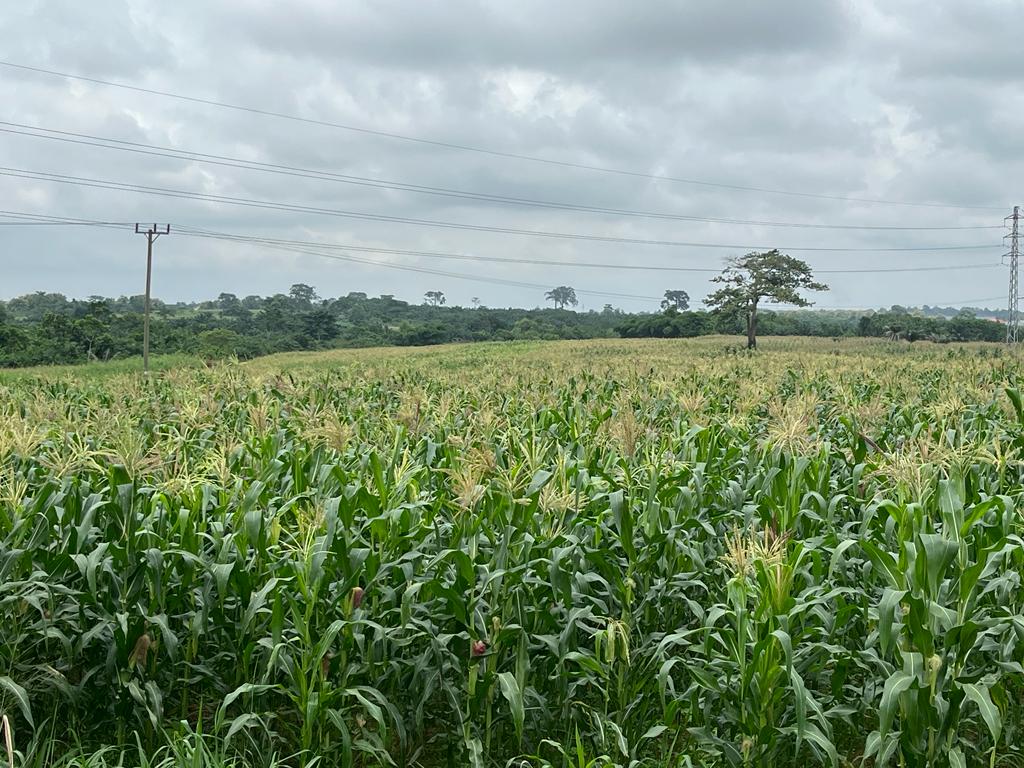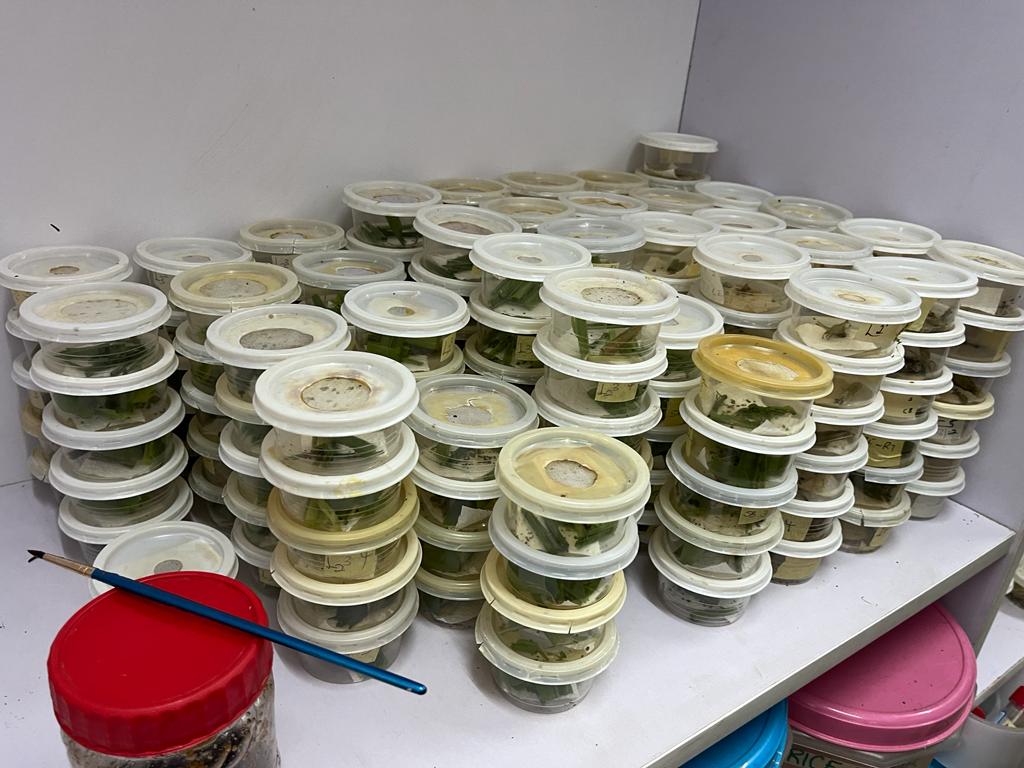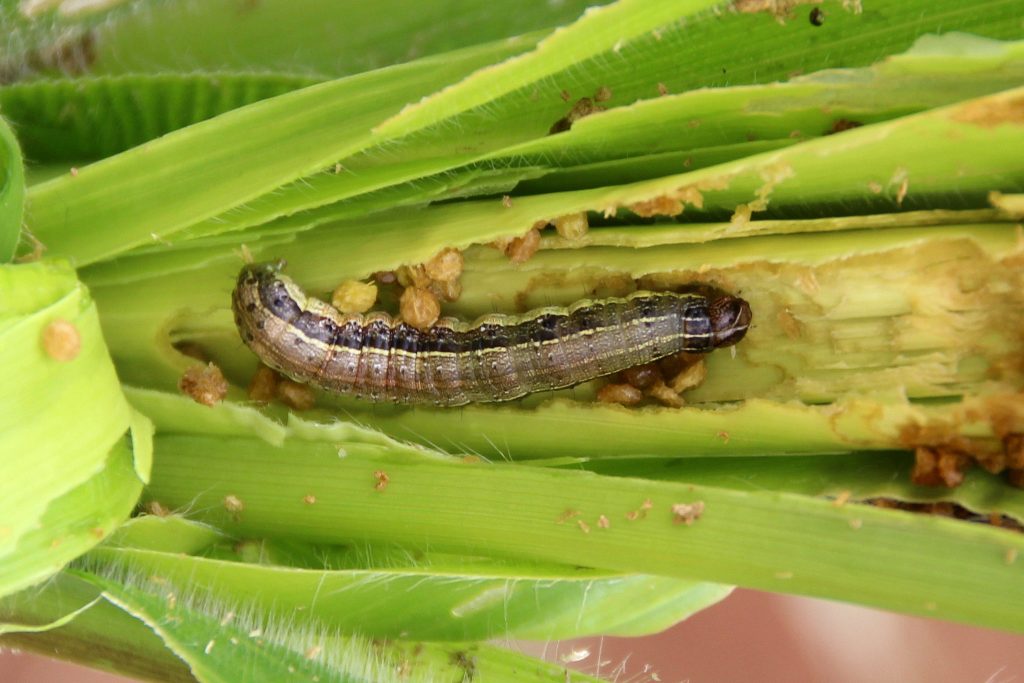By Albert Oppong-Ansah
Accra, Aug. 29, GNA – SUPERINTENDENT Martin Duah looks elated as he surveys his 40-acre maize field, which has thick, stubby cobs.
For the sixth consecutive farming seasons the field has stood the chance of surviving, the wrath of Fall Army Worm (FAW), a destructive pest with high mobility, nocturnal feeding behaviour, and overlapping life stages.
‘More than 95 per cent of my field of maize are intact, not as heavily infested as years before,’ Supt. Duah, who is in charge of Agriculture at the Male section of Ghana’s Medium Prison at Nsawam tells the Ghana News Agency (GNA).
‘The worms ate almost the whole field in a few days in the 2016 cropping year. Subsequent years, chemical pesticides helped reduce the loss to a little more than 50 per cent.’ Getting a stable maize yield is crucial to the agriculture department of that vulnerable group (over 3,000 female and male inmates), because the government’s stipend, which is GHC1.80 ($0.16) per day per inmate, is barely enough.
Supt. Duah is not the only person excited. Hundreds of farmers at Ajumako, a town in the Central Region, and Pampaso, a community in Nsawam in the Eastern Region of Ghana, are elated because they are keeping FAW in check.
Maize is one of the main crops affected, which is of great concern as it contributes to the food insecurity of more than 300 million households in Africa.
The fall armyworm is a caterpillar that is native to the tropical and subtropical areas of the Americas. It was introduced for the first time in West African nations in 2016, including Ghana, and has since spread quickly to all of sub-Saharan Africa, parts of Asia, and Oceania. The pest attacks the floral parts of the plants that enhance food production. It devours leaves that facilitate photosynthesis and causes post-harvest losses depending on the stage of infestation, according to study by the Centre for Agriculture Biosciences International (CABI).
In new household surveys in Ghana and Zambia by CABI, 98 percent of farmers reported maize to be affected, but only 2-4 percent reported damage to Napier grass, sorghum or millet. The average maize loss reported by farmers in Ghana was 26.6 percent and in Zambia 35 percent. This is much lower than reported in 2017. Yield loss could be lower due to climatic factors, build-up of natural enemies or improved management. Farmers may be getting better at estimating FAW damage.

Extrapolating these losses nationally gives an estimate of $177 million lost value of the annual maize crop in Ghana and $159 million in Zambia. Most parts of Ghana and Zambia are highly suitable for FAW so countries with maize growing in areas less suitable for the pest might be expected to suffer less damage. But the relationship between environmental suitability and damage has yet to be established. To combat the worms on maize farms, the government spent GHC16 million on chemical pesticides in 2017, according to Ghana’s Ministry of Food and Agriculture.
Already, faced with low yield due to unreliable rainfall pattern, an impact of climate change, FAW is contributing to the country’s food inflation, which was 54.2 per cent in June 2023 because maize is a leading staple in Ghana.
At the continental level, maize yield losses due to FAW ranging from 11 to 58 per cent have been reported in various farming systems, translating into a revenue loss of up to $9.4bn annually, the CABI survey found.
Dr. Yurdi Yasmi, FAO Ghana Representative, believes FAW poses a threat to livelihoods, food security and resilience particularly for the most vulnerable population groups who lack the skills, equipment, and resources necessary to recognise new pest species and respond to them sustainably. Using natural ammunition to disarm armyworm
A group of scientists from the Food and Agriculture Organisation, CABI, the University of Ghana Soil and Irrigation Research Centre (SIREC), and the Plant Protection Regulatory Services Division (PPRSD) have collaborated to find a solution to the problem.
A member of the team, Copperfield Banini, told the GNA the team first identified more than 12 parasitoids but settled on the wasp Telenomus remus, a locally occurring natural enemy of FAW in Ghana.
In 2019, an experiment conducted at the laboratory that involved rearing the parasitoid and testing its efficiency subsequently showed that FAW is unable to hatch into a larva once the parasitoid lays its egg in the worm. The egg of the FAW eventually dies because the parasitoid feeds on the nutrients of its host and, in the process, starves it.

The study revealed that a female Telenumus remus lays about 240 eggs during its lifetime. That implies that just one female can destroy about 240 individual FAWs.
‘More parasitoids were reared, and we moved from the laboratory to the pilot maize field at Kpong. We released the first set of natural enemies on the two-week-old maize farm and the second after two weeks,’ Dr. Lakpo Koku Agboyi, Scientist, Invasive Species Management at CABI, recounts.
‘After the release of the parasitoid, we complemented it with the biopesticide, which only kills the FAW but no other organisms like pollinators and insects. This is because spraying any synthetic chemical will kill the parasitoid.’
At the end of the two seasons of field trials, he says the team observed that FAW presence was lower and yield was equally good, he said. During the trials, selected farmers were trained and the technology replicated on their fields.

‘They witnessed improved yields at the end of the season. The infestation at farms declined drastically,’ he said.
Aside from Ghana, Dr. Agboyi tells GNA that some studies on biological control of FAW were also conducted in Burkina Faso, Zambia, Uganda, and Kenya.
These studies centre not only on the parasitoid complex of FAW but also on the effectiveness of fungi, bacteria, and viruses that infect the FAW and cause diseases.
Time to upscale
The invasion of FAW still lingers at farms in parts of the Upper East, West, Brong, Northern, Bono, and Ahafo Regions of Ghana, the GNA has gathered. The PPRSD says the FAW infestation can be reduced if three more laboratories are established to rear more Telenumus remus. They also want more consumables for existing laboratories.
For Dr. Charles Nyaaba, the Executive Director of the Peasant Farmers Association of Ghana, state and non-state actors should urgently partner to upscale the approach to reduce the armyworm infestation.
‘FAW infestation is increasing the rate of chemical use by farmers. I am worried because it is not good for our food system, costs farmers, and is dangerous for the environment,’ he said.
Dr Shaibu Baani Azumah, an agricultural economist, agrees with the assertion of surge in use of chemical fertiliser and adds that scientific findings have proven that it contaminates water bodies and impacts negatively on the climate by emitting greenhouse gases.
‘There have been instances where traces of chemical insecticides have been found in the breast milk of lactating mothers working around irrigation facilities, which has had a negative impact on their babies,’ he said. Azumah suggests that the technology should be upscaled nationally, and the Agricultural Section of the African Union and ECOWAS must respond by taking steps to verify the potency of the technology and adapt it in their respective countries.
‘If we solve the FAW infestation in Ghana alone, we will not be doing a good job because it has become a global issue and must be addressed as such,’ he recommends.
The FAO the Global Action for FAW control initiative is supporting MoFA to promote biocontrol as part of an integrated pest management because it has no public health issues and environmental footprint, says Dr Yasmi. Achieving global goals
Jewel Kudjawu, Chairperson of the Invasive Species Working Group, says the FAW is an invasive species in Ghana and Africa and calls for swift measures to upscale the technology to reduce or mitigate its impacts by at least 50 percent by 2030.
‘Reducing FAW means contributing to achieving target six of the Kunming-Montreal Global Biodiversity Framework,’ he said.
This effective integrated pest management to reducing FAW should not be limited to the medium prisons and farmers in Ajumako and Pampaso but to the nooks and crannies of Ghana, Africa, and other continents.
GNA